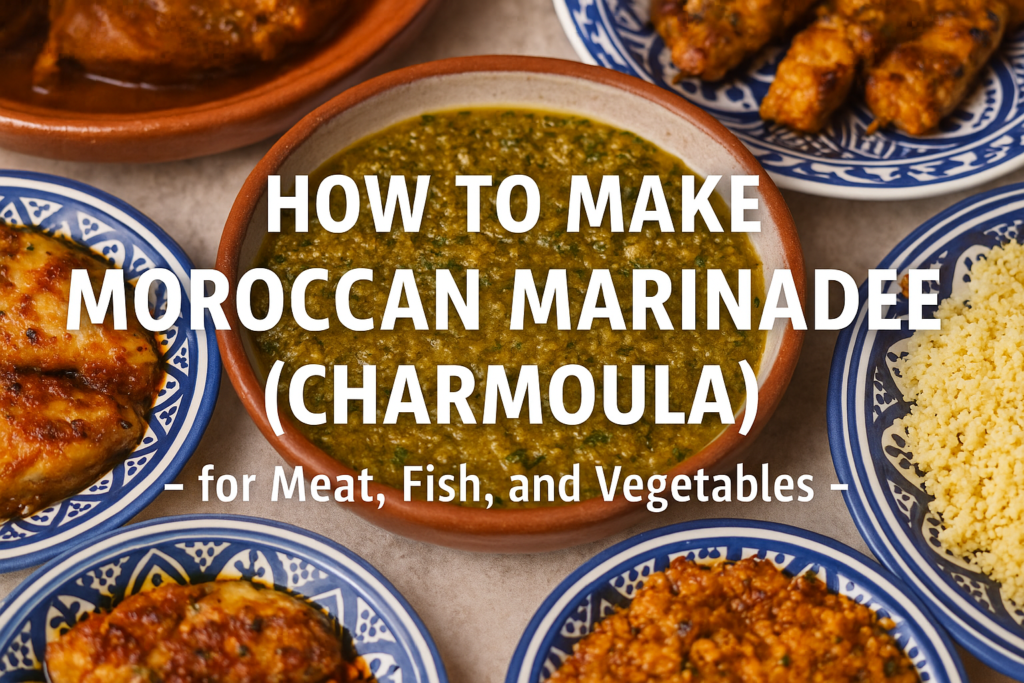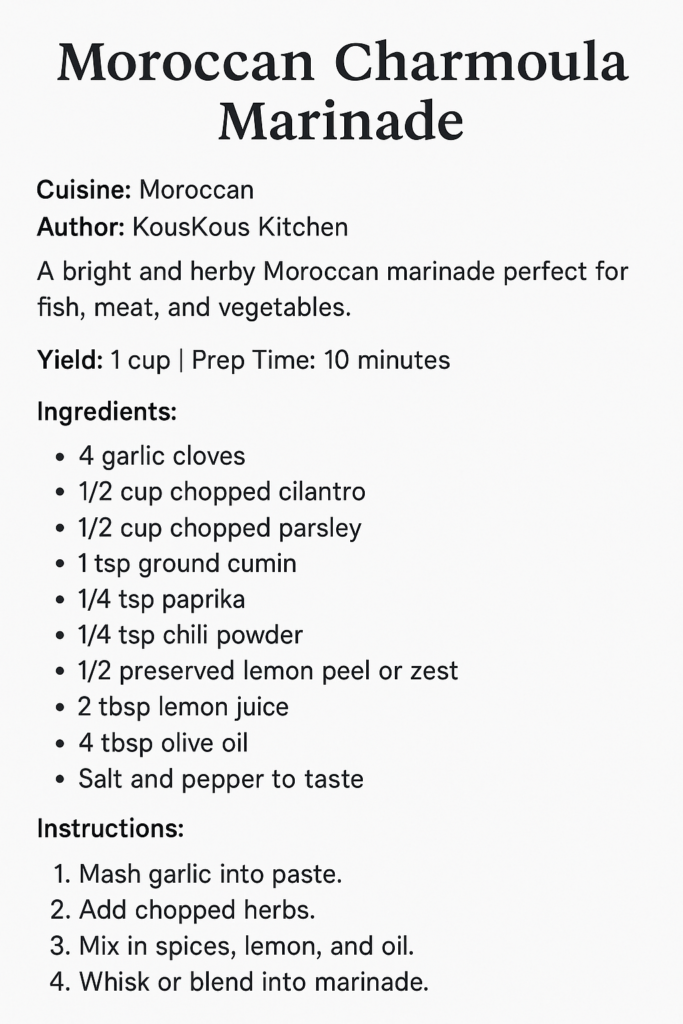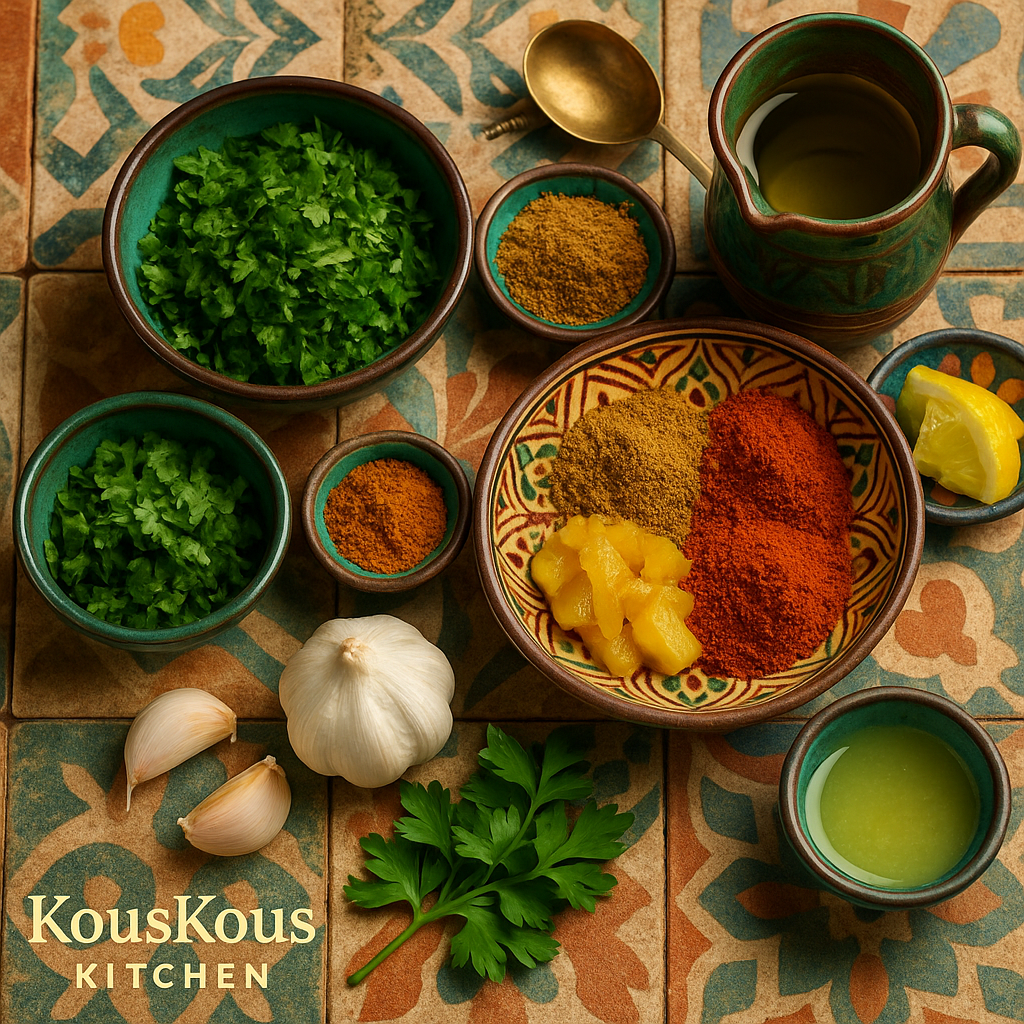What is Charmoula? Morocco’s Magical Marinade

In the rich tapestry of Moroccan cuisine, few things are as versatile and essential as charmoula (also spelled chermoula). This vibrant marinade is the flavor base behind many iconic dishes, used to season everything from delicate seafood to hearty lamb tagines. Learning how to make Moroccan marinade for meat and fish is like unlocking a culinary treasure chest. With roots in both Arab and Berber traditions, charmoula is a true representation of Morocco’s layered, spice-driven food culture.
From the coast of Essaouira to the spice stalls of Marrakech, charmoula has countless variations, each one a burst of herbs, garlic, lemon, and spice. Whether you’re preparing grilled sardines, roasted vegetables, or slow-cooked tagines, charmoula brings depth, brightness, and authenticity to every dish.
Preserved Lemon + Garlic + Spices: Building Layers of Flavor
At its heart, charmoula is a raw paste or sauce made by blending fresh herbs, aromatic spices, and acidic elements like lemon juice or vinegar. Here’s what you’ll typically find in a basic Moroccan charmoula recipe:
Core Ingredients:
- Fresh garlic – pungent and aromatic, it’s the backbone of charmoula.
- Flat-leaf parsley and cilantro (coriander leaves) – for a fresh, grassy herbal punch.
- Ground cumin – earthy and warm.
- Sweet paprika – adds mild spice and brilliant color.
- Chili powder or cayenne (optional) – for heat.
- Lemon juice or vinegar – acidity balances and brightens the mix.
- Preserved lemon peel (optional) – deeply savory, citrusy flavor typical in coastal regions.
- Extra virgin olive oil – gives the marinade body and richness.
- Salt and black pepper – to enhance and balance all the elements.
This aromatic paste is typically pounded in a mortar and pestle or blended into a smooth mixture. The result is tangy, spicy, and intensely flavorful.
Regional Twists: From Fez to Agadir
Charmoula is not one-size-fits-all. Each Moroccan city and family has its own version:
- Fez: Known for delicate spices and occasional use of saffron in charmoula.
- Agadir: Coastal cooks add more heat with fresh green chilies and use charmoula heavily with sardines.
- Berber regions: Often include vinegar instead of lemon juice and dried herbs to preserve the marinade.
- Tangier: May include bay leaf or onion in the blend.
These regional flavors reflect local produce and cultural influence. Don’t be afraid to experiment based on what you have.
Fish + Meat + Veggies: How to Use Moroccan Marinade Everywhere
1. Marinating Fish: Sea Bass, Sardines, or Mackerel
Rub charmoula all over the fish and inside the cavity if whole. Let it marinate for 1–2 hours before baking, grilling, or pan-frying.
- Example: Baked sea bass in charmoula with lemon slices.
- Tip: Add thinly sliced potatoes and tomatoes in the pan for a full meal.
2. Grilled or Tagine Lamb and Chicken
Charmoula makes an excellent rub or marinade for meat.
- For grilled chicken thighs or lamb chops, marinate for 4+ hours or overnight.
- For tagines, coat meat before cooking and optionally refresh the dish with a spoonful added before serving.
3. Roasted or Pickled Vegetables
Carrots, eggplant, zucchini, and even potatoes come alive with charmoula.
- Try this: Roast carrots and toss them in warm charmoula before serving.
- Vegetarian tip: Add chopped preserved lemon for an extra hit of umami.
Charmoula + Moroccan Grilling: The Secret Sauce

Summer in Morocco means family grills filled with spiced meats and fish, and charmoula is always at the center. In coastal towns, it’s common to see sardines packed with charmoula and grilled over coals. In the mountains, you might find lamb brochettes brushed with a thicker, oilier charmoula during cooking.
Want that true Moroccan flavor?
- Use charcoal or wood if possible.
- Brush charmoula before and after grilling for extra punch.
- Combine with yogurt for a milder version if cooking for kids.
How to Make Moroccan Marinade for Meat and Fish
Here is a flexible and authentic charmoula base recipe:
Ingredients:
- 4 garlic cloves
- 1/2 cup chopped cilantro
- 1/2 cup chopped parsley
- 1 tsp ground cumin
- 1 tsp paprika
- 1/4 tsp chili powder (optional)
- 1/2 preserved lemon peel, finely chopped (or zest of 1 fresh lemon)
- 2 tbsp fresh lemon juice (or vinegar)
- 4 tbsp extra virgin olive oil
- Salt and black pepper to taste
Instructions:
- Smash garlic into a paste using a mortar and pestle or food processor.
- Add herbs and pulse until combined.
- Mix in spices, lemon juice, preserved lemon, and olive oil.
- Blend or whisk into a thick marinade. Adjust seasoning.
Use immediately or store in the fridge up to 5 days. You can also freeze it in cubes!
Storage + Gift Tip
- Freeze in ice cube trays for instant use in tagines.
- For travel, make a dry spice blend version without oil and lemon. Add wet ingredients later.
- Pour into jars and label for DIY foodie gifts.
Internal Pairings for Your Moroccan Menu
To truly taste Morocco, pair charmoula-marinated dishes with these recipes:
- How to Make Authentic Moroccan Tagine: A Step-by-Step Recipe
- How to Make Traditional Moroccan Harira
- How to Make Authentic Moroccan Couscous
- How to Make Moroccan Atay Tea
Moroccan Charmoula Marinade
Cuisine: Moroccan
Author: KousKous Kitchen
Description: A bright and herby Moroccan marinade perfect for fish, meat, and vegetables.
Yield: 1 cup | Prep Time: 10 minutes
Ingredients:
- 4 garlic cloves
- 1/2 cup chopped cilantro
- 1/2 cup chopped parsley
- 1 tsp ground cumin
- 1 tsp paprika
- 1/4 tsp chili powder
- 1/2 preserved lemon peel or zest
- 2 tbsp lemon juice
- 4 tbsp olive oil
- Salt and pepper to taste
Instructions:
- Mash garlic into paste.
- Add chopped herbs.
- Mix in spices, lemon, and oil.
- Whisk or blend into marinade.
Final Thoughts
Now that you know how to make Moroccan marinade for meat and fish, you have a powerful tool to elevate your everyday meals. Whether you’re grilling chicken, baking sardines, or simply dressing vegetables, charmoula is your gateway to Moroccan flavor.
With just a handful of herbs, spices, and pantry staples, you can transform even the simplest ingredients into a feast. So grab your mortar, some garlic, and olive oil—and start marinating the Moroccan way!

